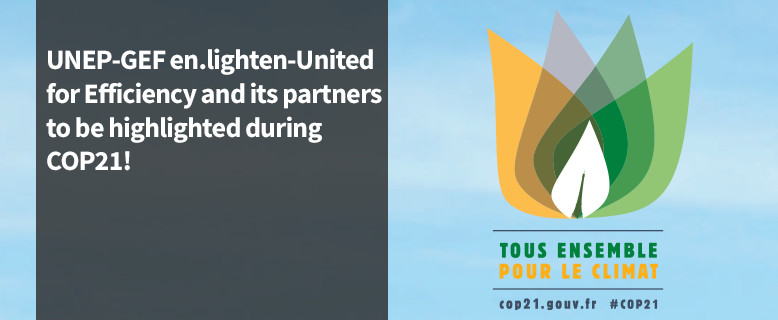
UNEP-GEF en.lighten-United for Efficiency and its partners to be highlighted during COP21!
With COP21 already underway, we want to highlight the events the UNEP-GEF en.lighten-United for Efficiency partnership will offer in Paris. We look forward to presenting our strong partnership, releasing new assessments (both at the city and national levels), and providing examples of countries and municipalities leapfrogging to energy-efficient lighting, appliances, and equipment.
U4E and its lighting project, the en.lighten initiative, comprise the global effort to advance energy-efficient lighting, appliances, and equipment. The partnership includes the United Nations Development Programme (UNDP), the International Copper Association (ICA), the environmental and energy-efficiency NGO CLASP, and the Natural Resources Defense Council (NRDC), and also includes private sector partners ABB, Arçelik, BSH Hausgeräte GmbH, Electrolux, MABE, Osram, Philips, and Whirlpool Corporation.
We look forward to showcasing the energy-savings potential that energy-efficient lighting, appliances, and equipment offer. Additional details on each event follow.
- Side event: “LED Street Lighting Solutions—an Easy Switch for Cities”
7 December 2015, 10am, le Bourget—La Galerie des Solutions
- Energy Efficiency: The Game Changer - Interactive Energy Efficiency Accelerator Panels
7 December 2015, 10:30am, le Bourget—Climate Generations Space—Room 10
- Energy Efficiency—the potential solution to 50% of the GHG emissions reductions for a 2 degree pathway
7 December 2015, 3pm – 6:40pm with Lighting, Appliances, and Equipment schedule between 4:30pm – 6pm, le Bourget—Blue Zone
Side event on “LED Street Lighting Solutions—an Easy Switch for Cities”
LED street lighting solutions can deliver energy savings 40 – 70 per cent higher than traditional lighting technologies, and their maintenance costs are close to zero. This event will bring together the UNEP en.lighten-U4E initiative, les Eco Maires, ADEME and its partners (Philips Lighting, Osram, Sunna Design, World Bank, IEA 4E SSL Annex and the Climate Group) to present innovative programs, new city lighting assessments and policy recommendations to increase the transition to advance LED lighting technologies and controls in cities around the world.
Date: 7 December 2015
Time: 10am – 12:30pm
Venue: le Bourget (La Galerie des Solutions)
Access: The registration process for the "LED Street Lighting - an Easy Switch for Cities" side event will be processed online. Participants will need to register ahead of time directly on the website of "Les Galeries des Solutions": http://www.lagalerie-cop21.com/badge-dacces. For more information please contact:
cecile.martinphipps@ademe.fr and cecile.gracy@ademe.fr
Energy Efficiency: The Game Changer - Interactive Energy Efficiency Accelerator Panels
The Sustainable Energy for All (SE4ALL) initiative, led by UN Secretary-General and the President of the World Bank, has as one of its three objectives for 2030 a doubling of the global rate of improvement in energy efficiency. The Global Energy Efficiency Accelerator Platform was established to help reach this objective, with the en.lighten-U4E initiative leading the Accelerators on Lighting and Appliances & Equipment. The panel will bring together country and private sector partners of U4E, showing the potential opportunities such a partnership provides. U4E partners speaking at the event will include high-level representatives from ABB, Arçelik AŞ, Osram and the International Copper Association (ICA).
Date: 7 December 2015
Time: 10:30 – 12:00pm
Venue: le Bourget (Climate Generations Space—Room 10)
Access: open access. For more information please contact: jonathan.duwyn@unep.org and patrick.blake.affiliate@unep.org
Energy Efficiency—the potential solution to 50% of the GHG emissions reductions for a 2 degree pathway
Under the SE4ALL Lighting Accelerator, the event will include the official launch of the Global Lighting Challenge (GLC), which is a race to reach cumulative global sales of 10 billion in high-efficiency, high-quality and affordable advanced lighting products, such as light-emitting diode (LED) lamps. The Challenge will showcase new commitments and actions to accelerate the transition to high-efficiency, high-quality and affordable lighting that are consistent with the Challenge’s guiding principles. Further, the event will include the launch of the UNEP-GEF en.lighten-U4E country assessments showing the large financial, environmental, and energy benefits of transition to energy efficient lighting, refrigerators, air conditioners, electric motors, and distribution transformers, which are being released for approximately 100 countries.
Date: 7 December 2015
Venue: le Bourget - Blue zone
Time: all day (starts at 10:00am) and the energy efficiency session starting at 3:00pm
Access: Restricted access
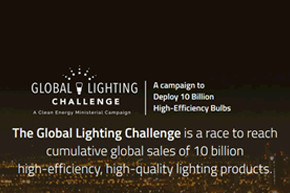
Launch of the Global Lighting Challenge
22 November 2015, Lighting accounts for more than 15% of the world’s electricity consumption – more than the electricity generated by all the nuclear power stations in the world - and around 5% of worldwide greenhouse gas emissions. What’s more, there are 1.4 billion people around the world who lack access to modern energy services, including reliable lighting, and are instead using energy sources such as kerosene that pose serious environmental and health risks.
In response to this issue, the Clean Energy Ministerial (CEM) is launching the Global Lighting Challenge (GLC). This is a race to reach cumulative global sales of 10 billion high-efficiency, high-quality, and affordable lighting products (such as Light Emitting Diodes - LEDs) as quickly as possible. The GLC brings together and elevates efforts to promote efficient lighting policies including the CEM’s Super-efficient Equipment and Appliance Deployment (SEAD) initiative and Global Lighting Energy and Access Energy Partnership (Global LEAP), United Nations Environment Programme and Global Environment Facility’s en.lighten initiative, International Finance Corporation’s Lighting Global, and International Energy Agency’s Energy Efficient End-Use Equipment Solid State Lighting Annex. Click here to learn more about the Global Lighting Challenge.
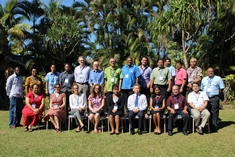
Pacific efficient light strategy will reduce greenhouse gas emissions and generate energy and financial savings
Nadi/Bangkok, 6 August 2015
Representatives from nine Pacific Island countries are gathering today in Nadi, Fiji, to validate the first ever Pacific Efficient Lighting Strategy (PELS) for the region’s transition to high efficiency, environmentally-sound lighting by 2020.
"By identifying concrete policy measures to be implemented, this new efficient lighting strategy holds the potential to reduce the region’s greenhouse gas emissions, while also decreasing dependence on petroleum imports and improving livelihoods,” the Deputy Director, Energy, of the Secretariat of the Pacific Community (SPC), Solomone Fifita, said.
By implementing the measures identified in the strategy, the region will reduce its electricity consumption for lighting by 36 per cent per year, save the region over US$ 1.7 billion by 2030, and reduce greenhouse gas emissions by 4.6 million tonnes over the same time period.
Read More >>.
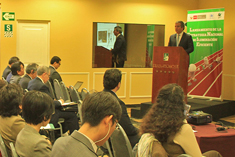
Peru initiates Transition to Efficient Lighting Workshop kicks-off the National Efficient Lighting Strategy
Lima, Peru, 16 July 2015
Government officials, representatives from laboratories, universities, utilities, civil society organisations, lighting and luminaire manufacturers, and from the recycling industry gathered on 16 July 2015 in Lima, Peru, to kick-off the development of Peru’s National Efficient Lighting Strategy.
The Efficient Lighting Strategy of Peru will be a cornerstone in achieving the objectives of the national GEF funded project, “Lighting Market Transformation in Peru”, led by the Peruvian Ministry of Energy and Mines with support from the UNEP-GEF en.lighten initiative.
H. E. Raúl Pérez-Reyes, Deputy Minister of Energy, opened the event stating the need to promote a sustainable market for efficient lighting products in Peru, taking advantage of the huge energy savings to be achieved and the decrease in cost of the highly efficient LED technology.
The Peru-GEF-UNEP project will contribute to: (1) strengthening the national regulatory framework promoting a sustainable efficient lighting market, (2) establishing an effective verification and quality control system for lighting products, (3) establishing a framework for the environmentally sound management of used lighting products, and (4) enhancing stakeholders’ awareness on the benefits of advanced lighting.
Lighting is responsible for close to 15% of annual electricity consumption in the country. According to the Deputy Minister of Energy “lamp replacement by more efficient technologies will not only help mitigating climate change, but it will also mean considerable financial savings for Peruvian families”.
Participants at the event expressed concern about the low quality and performance of some efficient technologies available on the market, which could undermine consumer confidence in LEDs. Hence the standardization and market surveillance that this project is to institute will be fundamental in ensuring a sustainable market lighting market transformation in Peru.
The UN Secretary General’s SE4ALL initiative identified lighting as a key priority to promote energy efficiency and mitigate climate change through its Global Energy Efficiency Accelerator Platform. Advanced lighting is critical to reduce electricity bills and greenhouse gas emissions, improve energy security, and trade balances. The UNEP-GEF en.lighten initiative is also working with governments in Central America and the Dominican Republic, Chile, and Bolivia to accelerate the market transformation to advanced lighting.
For additional information please contact Gustavo Mañez, en.lighten Project Manager, at: gustavo.manez@unep.org.
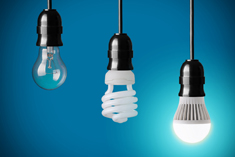
Accelerating the deployment of efficient lighting solutions through minimum energy performance standards
Jakarta, 7 July 2015 The United Nations Environment Programme (UNEP)-Global Environment Facility (GEF) en.lighten initiative is pleased to announce their new guidance note, Developing Minimum Energy Performance Standards for Lighting Products. Released during the SWITCH-Asia regional event – Advancing Energy Efficiency in Asia Through SCP and Green Finance – in Jakarta yesterday, this practical resource for governments will help policymakers better understand the benefits of minimum energy performance standards (MEPS) for achieving their energy efficiency goals.
Electricity for lighting accounts for almost 15% of electricity consumption and around 6% of CO2 emissions worldwide. MEPS offer a fundamental foundation for any Government striving to accelerate the deployment of efficient lighting solutions on a permanent and sustainable basis. Coupled with enabling legislation and an effective compliance strategy, they facilitate a transition to more efficient lighting by specifying the minimum energy efficiency of the products that may be offered for sale in the market.
This new UNEP-GEF en.lighten initiative guidance note provides a practical resource for governments on the issues to consider when establishing MEPS in their country. It outlines a step-by-step approach to integrating MEPS into national policies and strategies, and provides practical advice, reinforced by case studies, drawn from the experiences of those countries and regions already enforcing efficient lighting MEPS.
The guidance is as valid for those countries that have not yet implemented MEPS for energy efficient lighting and appliances, as it is to those that have already started the journey and would like to review and update their regulatory mechanisms to account for more ambitious targets.
Speaking from Jakarta, Dr Sanjayan Velautham, Executive Director of the ASEAN Center for Energy, highlighted the relevance of the guidance note: “Minimum energy performance standards can go a long way as part of a package of measures to improve energy efficiency and contribute in our efforts to reduce greenhouse gases emissions in the ASEAN region. This publication comes timely with the ASEAN harmonization of lighting standards which will be initiated this year.”
UNEP hopes that governments will be inspired by the case presented and will make it a reality by developing and implementing lighting MEPS in support of energy efficiency and climate change mitigation.
To download a copy of the guidance note, click here >>.
Icherisheher keeps the lights on and paves way for major emission cut
Azerbaijan, 1 Jul 2015 A demonstration project, supported by UNEP, for replacing inefficient public street lights was launched in Azerbaijan's capital of Baku on 1 June 2015. The project, which will see some 600 LED lamps replacing public street lights in Icherisheher, provides an example of how this historic reserve could go on to take a major step towards achieving its 2020 climate goal.
The move to replace inefficient street lights with LED ones comes under one of the ambitious climate action plans that UNEP is coordinating as part of the European Commission’s ‘Covenant of Mayors (COMO) Going East’ programme. Icherisheher has been a signatory to COMO since 2012.
read more >>.
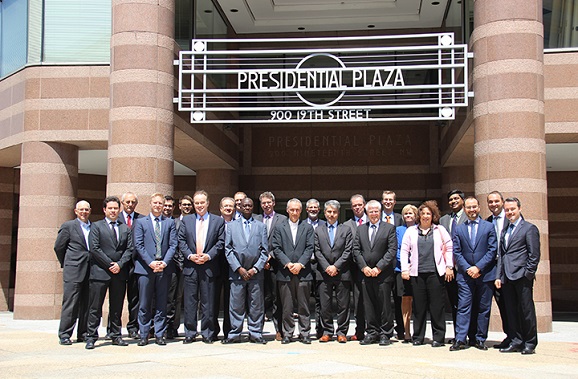
Joint Steering Committee of the en.lighten and United for Efficiency initiatives: the two SE4All Accelerators join forces to leapfrog to high efficiency products
Washington D.C., 15 May 2015 The first joint Project Steering Committee meeting of the en.lighten and the new United for Efficiency, U4E, initiatives was held on 15 May 2015 at the Global Environment Facility’s (GEF) Headquarters in Washington D.C. Jointly convened by the GEF Secretariat and the United Nations Environment Programme (UNEP), participants from 20 public and private sector partner organisations attended the meeting, including the United Nations Development Programme (UNDP), Sustainable Energy for All, World Bank, International Copper Association (ICA), CLASP, Natural Resources Defense Council (NRDC), Southern African Power Pool, South Africa’s national utility Eskom, as well as leading manufacturers of lighting, appliances and equipment such as Philips, OSRAM, ABB, Arcelik, BSH Group, Electrolux, and MABE.
Both initiatives constitute the engines of the SE4All Accelerators on lighting (en.lighten) and appliances (U4E). UNEP estimates that electricity consumption for lighting, appliances and equipment will amount to over 50% of global electricity consumption by 2030. These initiatives are joining forces to assist countries in leapfrogging to high efficient lighting, appliances and equipment and reducing considerably its electricity consumption and climate impacts.
The meeting took stock of the progress achieved by both initiatives in the past 12 months. en.lighten has directly supported over 50 countries and is working with several regions, including the Association of Southeast Asian Nations (ASEAN), the Economic Community of West African States (ECOWAS) and Middle East and North Africa to develop and/or implement regional efficient lighting strategies. One billion people in close to 50 countries are using more efficient products, thanks to support en.lighten provided. U4E has mobilised the commitment of countries, in particular in Latin America and the Caribbean and Southern Africa, as well as the support of private sector partners for a global transition to energy efficient products.
Participants discussed how to best build synergies between en.lighten and U4E that will ultimately catalyse action by governments to transform their markets to high efficiency products. This is of particular importance in the run-up to the 21st Conference of Parties (COP 21) of the United Nations Framework Convention on Climate Change (UNFCCC) in December in Paris, where a new international climate agreement is expected to be adopted, and where governments will announce their ambitions and actions to mitigate climate. Since its creation in 2010, 66 countries around the world have joined the UNEP-GEF en.lighten initiative to put in place integrated policies phasing-out inefficient incandescent lamps. en.lighten counts with the support of partners, including from two leading efficient lighting manufacturers OSRAM and Philips Lighting.
The joint meeting also provided strategic guidance on the way forward of both initiatives, highlighting the importance of coordinated regional approaches as a means to achieve a fast transition to efficient lighting, appliances and equipment. The en.lighten model is now taken on a new level through U4E, extending the scope to other appliances and equipment offering a high potential for significant electricity and greenhouse gas emissions savings. These products include residential refrigerators, room air conditioners, electric motors, distribution transformers and information and communication technologies. en.lighten will broaden its scope to accelerate the deployment of LEDs, and to efficient commercial, industrial, and outdoor applications.
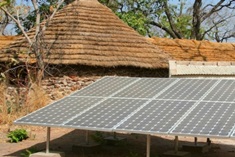
UN Report Outlines Ways to Achieve Clean, Sustainable Off-Grid Lighting for Africa
New York, 18 May 2015 Creating favourable conditions for modern solar lighting markets can provide a low-cost solution to reducing carbon emissions, indoor air pollution and health risks, while bringing electricity to an estimated 600 million people in Africa who lack access to the power grid, says new report by United Nations Environment Programme
(UNEP).
The report, entitled Developing Effective Off-Grid Lighting Policy - Guidance Note for Governments in Africa, recommends best practices and smart policies enabling the market uptake of off-grid lighting solutions. It was unveiled today at the Sustainable Energy for All (SE4All) annual forum, which convenes private sector, governments, energy access practitioners, off-grid lighting experts, civil society and international donors to achieve the target of universal energy access by 2030.
read more >>.
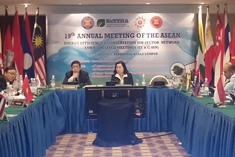
ASEAN Commits to Switch to Efficient Lighting
Harmonised standards and policy will slash energy consumption in ASEAN region
Paris, France, 29 April 2015 ASEAN member states have committed themselves to work together to switch to efficient lighting standards and policies, a move that will significantly reduce energy consumption in the region. This agreement was reached at the 19th annual meeting of the Energy Efficiency & Conservation Sub-Sector Network (EE&C-SSN) in Kuala Lumpur on 24 April 2015.
read more >>.
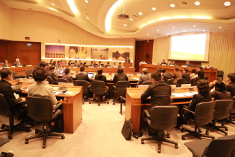
Government Officials from Asia and the Pacific Focus on Efficient Lighting in the Region
Lighting is Responsible for over 15% of Electricity Consumption in Asia
Paris, France, 6 February 2015 Over 70 government officials, leading industry representatives, laboratories and technical institutions from 20 Asia and the Pacific countries met from 3 to 4 February 2015 at the United Nations Conference Centre in Bangkok, Thailand, to consider opportunities for ensuring adequate market surveillance and harmonized policy for efficient lighting.
Read Communique here.
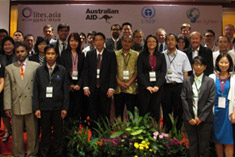
UNEP/lites.asia Regional Efficient Policy Workshop
Jakarta, Indonesia, 21 August 2014 – Policy makers from ministries of energy and the environment, standards bodies, laboratories and industry organizations from 18 countries within Southeast Asia, South Asia, the Pacific and Europe, met in Jakarta for the United Nations Environment Programme (UNEP)/ lites.asia regional lighting policy workshop.
read more >>
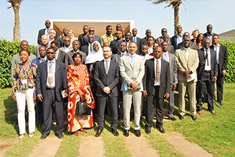
ECOWAS Agreement
Dakar, Senegal, 10 May 2014, – Government officials from the Economic Community of West African States (ECOWAS) and international organizations agreed on a Regional Efficient Lighting Strategy which will facilitate the transition to the universal use of energy efficient lighting in the region by 2020. The new roadmap was announced at a validation workshop hosted in Dakar.
read more >>
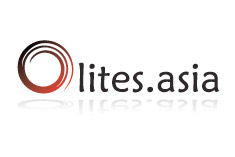
Ninth lites.asia meeting
Kuala Lumpur, Malaysia, 22 - 23 April 2014, – The ninth lites.asia regional lighting policy meeting will be held in Kuala Lumpur, Malaysia on 22 - 23 April 2014. It will focus on monitoring, verification and enforcement activities and infrastructure in Southeast Asia and the Pacific; developing a National or Regional Efficient Lighting Strategy; the latest information on lighting standards and labelling; and a briefing on off-grid lighting testing and laboratory certification.
For more information and to register, click here:
http://www.lites.asia/news-and-events/events-workshops/ninth-lites-asia-meeting-april-2014
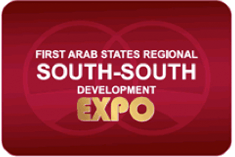
1st Arab South-South Development Expo showcases the en.lighten initiative
Doha, Qatar, 18 - 20 February 2014 – The en.lighten initiative was showcased at the 1st Arab South-South Development Expo as a powerful and cost-effective solution to tackle energy issues in the Arab World. Eng. Fethi Hanchi, Director of Energy Efficiency in Tunisia, shared the lessons learned from Tunisia's experience of developing a National Efficient Lighting Strategy and encouraged other countries in the region to follow the same direction.
read more >>